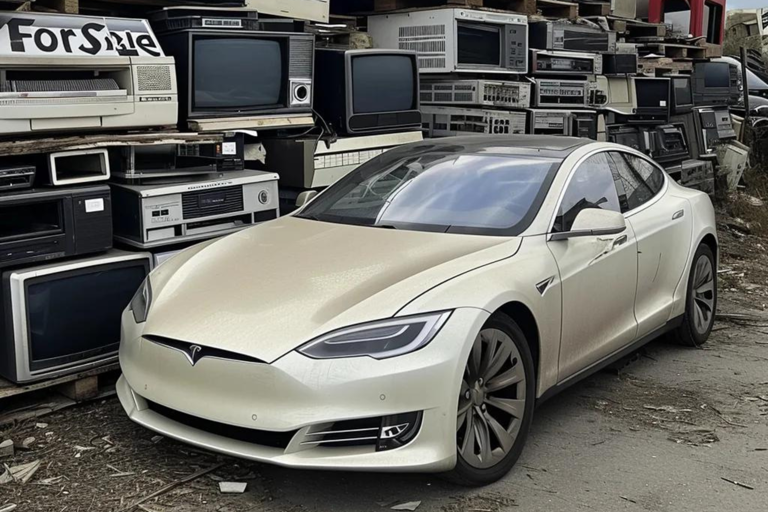Electric vehicles (EVs) are frequently touted as the future of transportation due to their environmental benefits and technological advancements. However, there is a concern regarding their resale value compared to traditional gasoline-powered vehicles.
EVs are essentially sophisticated computers on wheels, equipped with advanced technology and electric motors. As with any electronic device, EVs may experience depreciation over time similar to that of used computers rather than traditional petrol-based vehicles.
The resale value of EVs could be impacted by several factors, including rapid advancements in battery technology, concerns about battery degradation over time, and the availability of charging infrastructure. Additionally, consumer preferences and market demand for EVs may influence their resale value in the long term.
While EVs offer numerous advantages, including lower operating costs and reduced emissions, potential buyers may consider these factors when assessing the resale value of used electric vehicles. As the EV market continues to evolve and mature, it remains to be seen how resale values will compare to those of gasoline-powered vehicles in the years to come.
Rapid Technological Advancements
Just as with computers, electric vehicles (EVs) are susceptible to rapid advancements in technology. When newer EV models are introduced with improved features such as longer battery range, faster charging times, and enhanced performance, older models may experience a decrease in demand and resale value.
Consumers may be more inclined to purchase the latest EV models that offer better technology and features, causing older models to depreciate in value. This phenomenon is often observed in the technology sector, where older products quickly become obsolete as newer and more advanced versions are introduced to the market.
As battery technology continues to evolve and manufacturers introduce EVs with improved capabilities, older models may struggle to compete in terms of performance and efficiency. Consequently, their resale value may decline as consumers prioritize newer models with the latest advancements.
Battery Degradation
Battery degradation is a crucial factor to consider when evaluating the resale value of electric vehicles (EVs). Similar to how diminishing battery life can detract from the appeal of a computer for potential buyers, the condition of an EV’s battery pack significantly influences its market value.
The battery is indeed one of the most vital components of an EV, as it directly affects the vehicle’s range and performance. Over time, EV batteries experience degradation, causing a gradual reduction in their ability to store and hold energy. This decrease in battery capacity translates to decreased driving range, which can be a significant concern for prospective buyers.
As EV batteries age and undergo degradation, the vehicle’s overall range diminishes, impacting its usability and appeal in the resale market. Potential buyers may be hesitant to purchase an EV with a degraded battery, as they may perceive it as less reliable or cost-effective to operate.
Therefore, battery health and the extent of degradation are crucial considerations for both current EV owners and prospective buyers. Maintaining the health of the battery pack through proper charging habits and maintenance can help mitigate degradation and preserve the vehicle’s resale value over time.
High Replacement Costs
Indeed, the cost of replacing a battery in an electric vehicle (EV) can be a significant deterrent for potential buyers and may contribute to the depreciation of resale value. A recent survey conducted by a battery health study firm, which polled approximately 15,000 EV owners, revealed that 1.5% of respondents required battery replacements during their ownership period.
The expense associated with battery replacements can vary widely, ranging from $5,000 to $20,000, depending on the specific EV model and battery type. For some older EVs, particularly those dating back to 2011, the need for battery replacement may become more prevalent as these vehicles age. However, even newer EVs, which constitute a large majority of the surveyed vehicles, may require costly battery replacements due to wear and tear over time.
The cost of replacing an EV battery is comparable to replacing a major component in a computer, both in terms of expense and impact on the overall functionality of the device. This high cost of battery replacement can significantly deter potential buyers of used EVs, as they may perceive it as a substantial financial burden and a potential risk factor for future ownership.
As a result, the potential need for battery replacement and its associated cost can contribute to the depreciation of resale value for EVs, further highlighting the importance of battery health and maintenance in preserving the overall value of these vehicles in the secondary market.
Software Updates
Indeed, both computers and electric vehicles (EVs) heavily rely on software, and older models may not support the latest updates. This lack of support can result in decreased functionality and pose security risks, a common issue observed in computers. Similarly, EVs may face challenges as newer models introduce advanced features like improved autopilot systems or energy efficiency enhancements, which may not be available in older models.
While EVs offer various benefits such as reduced emissions and lower fuel costs, their resale value may be impacted by several factors, including rapid technological advancements, battery degradation, high replacement costs, and outdated software. These challenges mirror those encountered in the used computer market and are likely to influence the trajectory of used EVs.
Given these considerations, consumers should carefully evaluate these factors when considering an investment in an EV, recognizing that technological obsolescence and associated costs may affect the vehicle’s long-term value. As with any technology purchase, staying informed about advancements and potential limitations is crucial for making informed decisions and maximizing the value of the investment.
